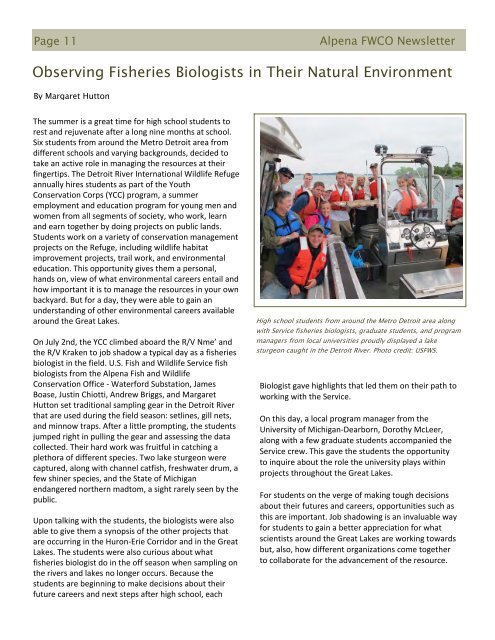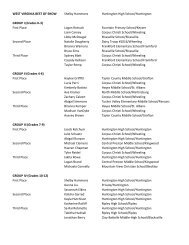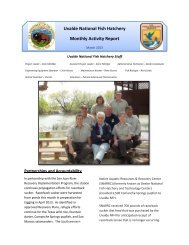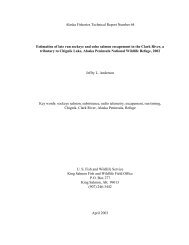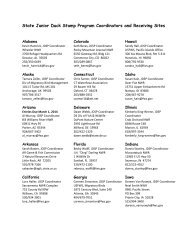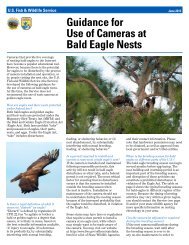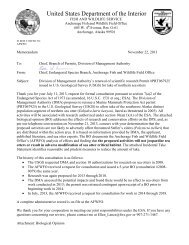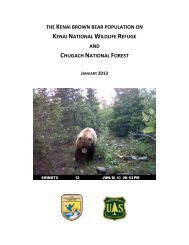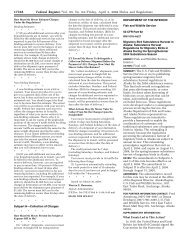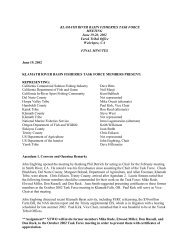July - U.S. Fish and Wildlife Service
July - U.S. Fish and Wildlife Service
July - U.S. Fish and Wildlife Service
You also want an ePaper? Increase the reach of your titles
YUMPU automatically turns print PDFs into web optimized ePapers that Google loves.
Page 11<br />
Alpena FWCO Newsletter<br />
Observing <strong>Fish</strong>eries Biologists in Their Natural Environment<br />
By Margaret Hutton<br />
The summer is a great time for high school students to<br />
rest <strong>and</strong> rejuvenate after a long nine months at school.<br />
Six students from around the Metro Detroit area from<br />
different schools <strong>and</strong> varying backgrounds, decided to<br />
take an active role in managing the resources at their<br />
fingertips. The Detroit River International <strong>Wildlife</strong> Refuge<br />
annually hires students as part of the Youth<br />
Conservation Corps (YCC) program, a summer<br />
employment <strong>and</strong> education program for young men <strong>and</strong><br />
women from all segments of society, who work, learn<br />
<strong>and</strong> earn together by doing projects on public l<strong>and</strong>s.<br />
Students work on a variety of conservation management<br />
projects on the Refuge, including wildlife habitat<br />
improvement projects, trail work, <strong>and</strong> environmental<br />
education. This opportunity gives them a personal,<br />
h<strong>and</strong>s on, view of what environmental careers entail <strong>and</strong><br />
how important it is to manage the resources in your own<br />
backyard. But for a day, they were able to gain an<br />
underst<strong>and</strong>ing of other environmental careers available<br />
around the Great Lakes.<br />
On <strong>July</strong> 2nd, the YCC climbed aboard the R/V Nme’ <strong>and</strong><br />
the R/V Kraken to job shadow a typical day as a fisheries<br />
biologist in the field. U.S. <strong>Fish</strong> <strong>and</strong> <strong>Wildlife</strong> <strong>Service</strong> fish<br />
biologists from the Alpena <strong>Fish</strong> <strong>and</strong> <strong>Wildlife</strong><br />
Conservation Office ‐ Waterford Substation, James<br />
Boase, Justin Chiotti, Andrew Briggs, <strong>and</strong> Margaret<br />
Hutton set traditional sampling gear in the Detroit River<br />
that are used during the field season: setlines, gill nets,<br />
<strong>and</strong> minnow traps. After a little prompting, the students<br />
jumped right in pulling the gear <strong>and</strong> assessing the data<br />
collected. Their hard work was fruitful in catching a<br />
plethora of different species. Two lake sturgeon were<br />
captured, along with channel catfish, freshwater drum, a<br />
few shiner species, <strong>and</strong> the State of Michigan<br />
endangered northern madtom, a sight rarely seen by the<br />
public.<br />
Upon talking with the students, the biologists were also<br />
able to give them a synopsis of the other projects that<br />
are occurring in the Huron‐Erie Corridor <strong>and</strong> in the Great<br />
Lakes. The students were also curious about what<br />
fisheries biologist do in the off season when sampling on<br />
the rivers <strong>and</strong> lakes no longer occurs. Because the<br />
students are beginning to make decisions about their<br />
future careers <strong>and</strong> next steps after high school, each<br />
High school students from around the Metro Detroit area along<br />
with <strong>Service</strong> fisheries biologists, graduate students, <strong>and</strong> program<br />
managers from local universities proudly displayed a lake<br />
sturgeon caught in the Detroit River. Photo credit: USFWS.<br />
Biologist gave highlights that led them on their path to<br />
working with the <strong>Service</strong>.<br />
On this day, a local program manager from the<br />
University of Michigan‐Dearborn, Dorothy McLeer,<br />
along with a few graduate students accompanied the<br />
<strong>Service</strong> crew. This gave the students the opportunity<br />
to inquire about the role the university plays within<br />
projects throughout the Great Lakes.<br />
For students on the verge of making tough decisions<br />
about their futures <strong>and</strong> careers, opportunities such as<br />
this are important. Job shadowing is an invaluable way<br />
for students to gain a better appreciation for what<br />
scientists around the Great Lakes are working towards<br />
but, also, how different organizations come together<br />
to collaborate for the advancement of the resource.


